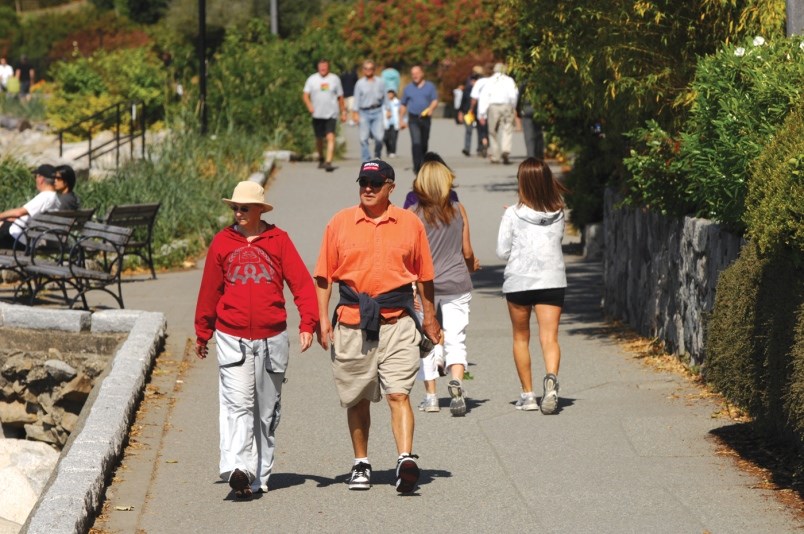Joggers on West Vancouver's Centennial Seawalk are being asked to slow their roll – or get up a bit earlier for their morning jog.
Runners who like to run along the 1.7-kilometre seawall from the bottom of 18th Street to Dundarave Park are being asked to do so before 10 a.m. on weekends.
The District of West Vancouver is asking joggers to keep pace with the request after receiving a number of complaints from pedestrians walking on the seawall who have been concerned that joggers were racing by too close for comfort, said Donna Powers, spokeswoman for the municipality.
The waterfront seawall is a popular place for people to stroll in West Vancouver, but lately, concerns about COVID-19 have made for an uncomfortable mix of runners and walkers, said Powers.
“A lot of citizens have expressed concerns about the mixing of joggers and pedestrians on the seawalk,” she said.
“Their concerns are that when joggers pass pedestrians, there's not enough physical distancing,” she said.
Powers added some people have suggested breath and sweat from joggers may somehow be able to spray further than a two-metre distance because of the speed at which they’re running past other people.
“Whether that’s based on scientific fact is not known yet, but it’s certainly a concern,” she said.
Michael and Catherine Trigg who live on Bellevue Avenue, close to the Seawalk, are among those who have contacted the municipality with concerns.
“There are some runners who ignore the two-metre rule, breathing hard, perspiring and running between walkers who are keeping to the two-metre rule,” they wrote in a letter to council.
Powers said the district has received similar complaints from about 20 people. “We’re receiving phone calls. We’re receiving emails,” she said.
In a phone call with the News, Michael Trigg said people have been getting better at observing distancing in recent days, but there are some serious runners who still seem oblivious to those around them.
Recently one shirtless man blasted past Trigg and his wife on the Seawalk. "He was running like he was in the Olympics," said Trigg. "His chest was wet with perspiration."
The neighbourhood near to the seawall has a high proportion of seniors living there, said Powers, so the waterfront tends to attract more of the most vulnerable citizens than other more rugged areas of the North Shore.
Powers said the main concern is that seniors are feeling uncomfortable when out walking.
In response, the district is asking joggers to limit their seawalk runs to the hours before 10 a.m. on the weekends and be mindful of keeping their distance from pedestrians.
The district is not closing the seawall to joggers, she added.
Powers said weekends tend to be busier on the Seawalk, and the municipality doesn’t have staff to enforce rules seven days a week.
She added the request of joggers is really that – an ask. If joggers choose to ignore it, the municipality doesn’t have the power to enforce it, she added.
The move to limit joggers to earlier in the morning comes about a week after the municipality considered installing separated lanes for eastbound and westbound foot traffic on the Seawalk to ensure people were observing two metres of physical distancing.
That plan was scrapped after district council and staff received a significant amount of blowback from the community.



